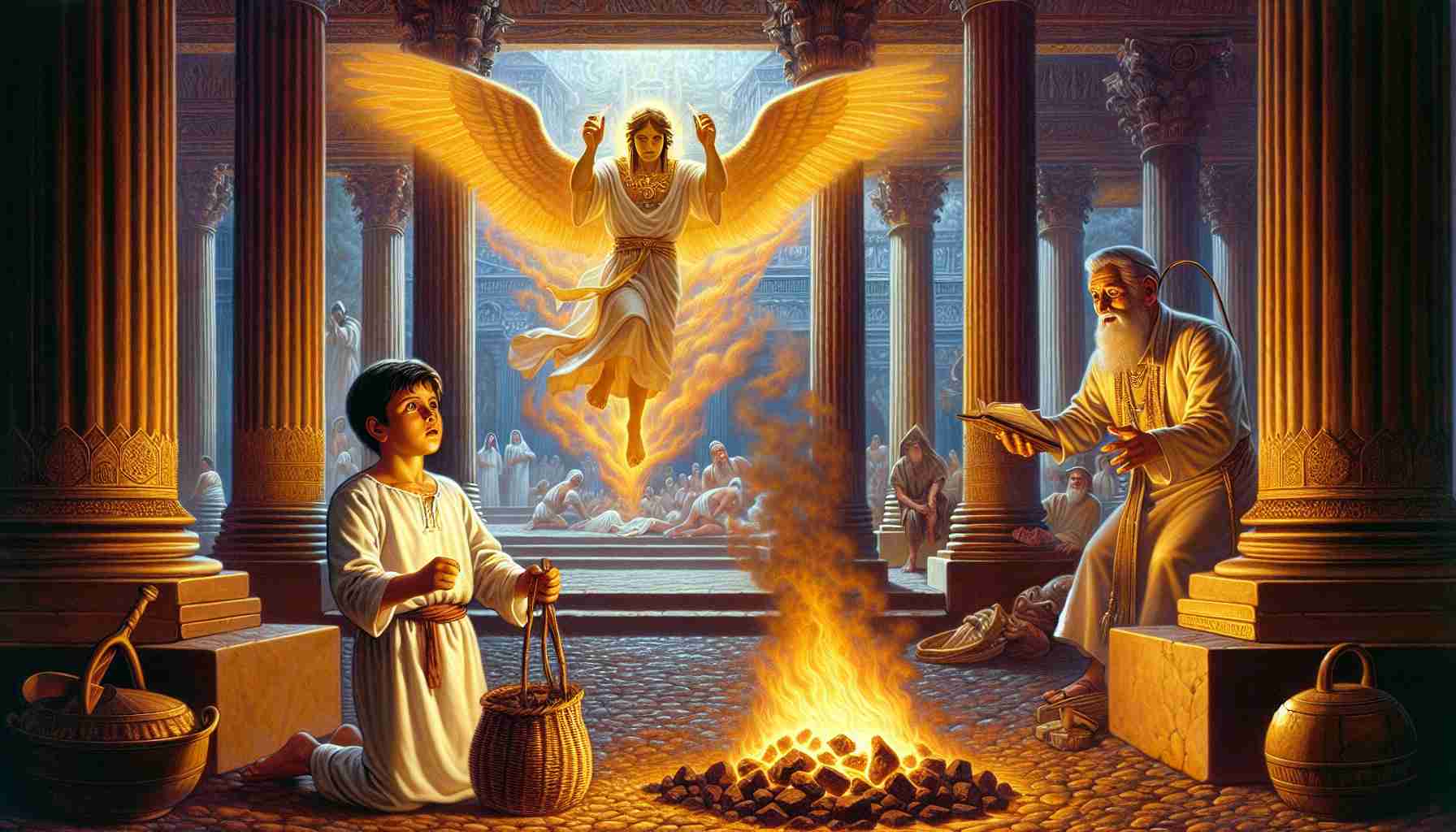

I was only a stonecutter in Jerusalem, not a prophet or scribe. My name is Asa, and I spent my days shaping limestone blocks for the Temple—block after block, day after day. My hands were thick with dust, my back bent from years under the sun. The inner sanctuary, the place where only the kohanim—the priests—could tread, felt a world away from where I worked.
But one morning, everything changed.
It was during a time of great fear. King Uzziah had died—he had ruled for decades, and though he made mistakes, Israel felt strong under his reign. Now the people whispered in fear: “What will Assyria do? Who will lead us?” My own heart trembled as much as my chisel.
I had gone to the Temple courtyard early, before the priests began their duties. I liked the quiet before the rush of worshippers. That morning, I was just turning a corner when I heard it—the cry of something unearthly, a voice that struck me like thunder and wrapped around my bones.
“Holy, holy, holy is the Lord of Hosts!” the voice rang out. “The whole earth is full of His glory!”
I froze. Through a thin crack in the wall, I saw inside the chamber. There was a man—Isaiah, I recognized him. A nobleman, a scribe perhaps, known for his wisdom. But he was on his face, trembling, his voice cracking as he cried, “Woe is me! For I am ruined! I am a man of unclean lips, and I live among a people of unclean lips—and my eyes have seen the King, the Lord of Hosts!”
I couldn’t move.
Above Isaiah, I saw them—seraphim, fiery angels with six wings hovering above the altar. One flew to the altar, took a burning coal with tongs, and flew toward Isaiah. With one smooth motion, it pressed the coal to his lips.
I expected Isaiah to scream, but instead he went silent. Then came a voice—no, not from the seraph, but from all around, from within the stones themselves. “Whom shall I send? And who will go for Us?”
Isaiah, now kneeling, raised his hand. “Here I am. Send me.”
My knees gave out beneath me. I don’t know how long I sat there. I felt heat on my face—not from the sun, but from the glory I had just witnessed. For the first time, I realized the weight of my own silence. I had spoken with bitter words, gossiped, cursed. I thought my work was low and unimportant. But if God could call Isaiah—a man with “unclean lips”—to be His messenger, who was I to think my hands were too rough for holiness?
Since that day, every stone I shaped felt like it belonged in sacred ground. I never told anyone what I saw. But I carved with reverence. Because I learned that when God speaks, even the strongest man will tremble—and even the humblest heart can be called.
I was only a stonecutter in Jerusalem, not a prophet or scribe. My name is Asa, and I spent my days shaping limestone blocks for the Temple—block after block, day after day. My hands were thick with dust, my back bent from years under the sun. The inner sanctuary, the place where only the kohanim—the priests—could tread, felt a world away from where I worked.
But one morning, everything changed.
It was during a time of great fear. King Uzziah had died—he had ruled for decades, and though he made mistakes, Israel felt strong under his reign. Now the people whispered in fear: “What will Assyria do? Who will lead us?” My own heart trembled as much as my chisel.
I had gone to the Temple courtyard early, before the priests began their duties. I liked the quiet before the rush of worshippers. That morning, I was just turning a corner when I heard it—the cry of something unearthly, a voice that struck me like thunder and wrapped around my bones.
“Holy, holy, holy is the Lord of Hosts!” the voice rang out. “The whole earth is full of His glory!”
I froze. Through a thin crack in the wall, I saw inside the chamber. There was a man—Isaiah, I recognized him. A nobleman, a scribe perhaps, known for his wisdom. But he was on his face, trembling, his voice cracking as he cried, “Woe is me! For I am ruined! I am a man of unclean lips, and I live among a people of unclean lips—and my eyes have seen the King, the Lord of Hosts!”
I couldn’t move.
Above Isaiah, I saw them—seraphim, fiery angels with six wings hovering above the altar. One flew to the altar, took a burning coal with tongs, and flew toward Isaiah. With one smooth motion, it pressed the coal to his lips.
I expected Isaiah to scream, but instead he went silent. Then came a voice—no, not from the seraph, but from all around, from within the stones themselves. “Whom shall I send? And who will go for Us?”
Isaiah, now kneeling, raised his hand. “Here I am. Send me.”
My knees gave out beneath me. I don’t know how long I sat there. I felt heat on my face—not from the sun, but from the glory I had just witnessed. For the first time, I realized the weight of my own silence. I had spoken with bitter words, gossiped, cursed. I thought my work was low and unimportant. But if God could call Isaiah—a man with “unclean lips”—to be His messenger, who was I to think my hands were too rough for holiness?
Since that day, every stone I shaped felt like it belonged in sacred ground. I never told anyone what I saw. But I carved with reverence. Because I learned that when God speaks, even the strongest man will tremble—and even the humblest heart can be called.